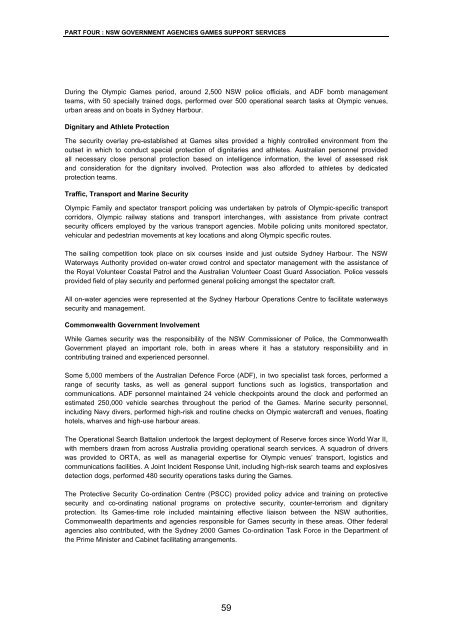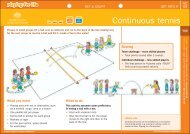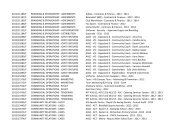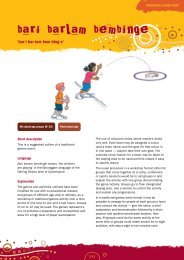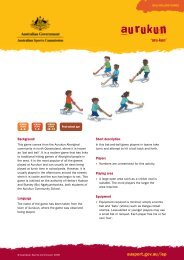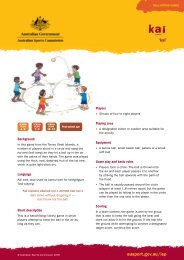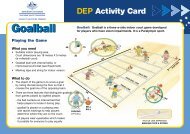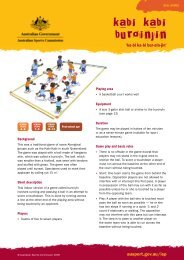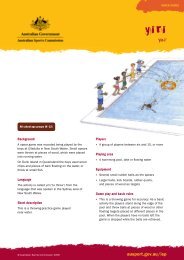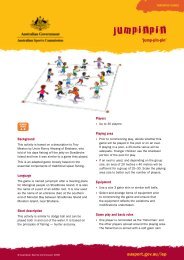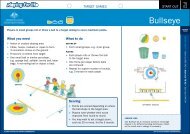the sydney 2000 olympic and paralympic games - Australian Sports ...
the sydney 2000 olympic and paralympic games - Australian Sports ...
the sydney 2000 olympic and paralympic games - Australian Sports ...
Create successful ePaper yourself
Turn your PDF publications into a flip-book with our unique Google optimized e-Paper software.
PART FOUR : NSW GOVERNMENT AGENCIES GAMES SUPPORT SERVICES<br />
During <strong>the</strong> Olympic Games period, around 2,500 NSW police officials, <strong>and</strong> ADF bomb management<br />
teams, with 50 specially trained dogs, performed over 500 operational search tasks at Olympic venues,<br />
urban areas <strong>and</strong> on boats in Sydney Harbour.<br />
Dignitary <strong>and</strong> Athlete Protection<br />
The security overlay pre-established at Games sites provided a highly controlled environment from <strong>the</strong><br />
outset in which to conduct special protection of dignitaries <strong>and</strong> athletes. <strong>Australian</strong> personnel provided<br />
all necessary close personal protection based on intelligence information, <strong>the</strong> level of assessed risk<br />
<strong>and</strong> consideration for <strong>the</strong> dignitary involved. Protection was also afforded to athletes by dedicated<br />
protection teams.<br />
Traffic, Transport <strong>and</strong> Marine Security<br />
Olympic Family <strong>and</strong> spectator transport policing was undertaken by patrols of Olympic-specific transport<br />
corridors, Olympic railway stations <strong>and</strong> transport interchanges, with assistance from private contract<br />
security officers employed by <strong>the</strong> various transport agencies. Mobile policing units monitored spectator,<br />
vehicular <strong>and</strong> pedestrian movements at key locations <strong>and</strong> along Olympic specific routes.<br />
The sailing competition took place on six courses inside <strong>and</strong> just outside Sydney Harbour. The NSW<br />
Waterways Authority provided on-water crowd control <strong>and</strong> spectator management with <strong>the</strong> assistance of<br />
<strong>the</strong> Royal Volunteer Coastal Patrol <strong>and</strong> <strong>the</strong> <strong>Australian</strong> Volunteer Coast Guard Association. Police vessels<br />
provided field of play security <strong>and</strong> performed general policing amongst <strong>the</strong> spectator craft.<br />
All on-water agencies were represented at <strong>the</strong> Sydney Harbour Operations Centre to facilitate waterways<br />
security <strong>and</strong> management.<br />
Commonwealth Government Involvement<br />
While Games security was <strong>the</strong> responsibility of <strong>the</strong> NSW Commissioner of Police, <strong>the</strong> Commonwealth<br />
Government played an important role, both in areas where it has a statutory responsibility <strong>and</strong> in<br />
contributing trained <strong>and</strong> experienced personnel.<br />
Some 5,000 members of <strong>the</strong> <strong>Australian</strong> Defence Force (ADF), in two specialist task forces, performed a<br />
range of security tasks, as well as general support functions such as logistics, transportation <strong>and</strong><br />
communications. ADF personnel maintained 24 vehicle checkpoints around <strong>the</strong> clock <strong>and</strong> performed an<br />
estimated 250,000 vehicle searches throughout <strong>the</strong> period of <strong>the</strong> Games. Marine security personnel,<br />
including Navy divers, performed high-risk <strong>and</strong> routine checks on Olympic watercraft <strong>and</strong> venues, floating<br />
hotels, wharves <strong>and</strong> high-use harbour areas.<br />
The Operational Search Battalion undertook <strong>the</strong> largest deployment of Reserve forces since World War II,<br />
with members drawn from across Australia providing operational search services. A squadron of drivers<br />
was provided to ORTA, as well as managerial expertise for Olympic venues’ transport, logistics <strong>and</strong><br />
communications facilities. A Joint Incident Response Unit, including high-risk search teams <strong>and</strong> explosives<br />
detection dogs, performed 480 security operations tasks during <strong>the</strong> Games.<br />
The Protective Security Co-ordination Centre (PSCC) provided policy advice <strong>and</strong> training on protective<br />
security <strong>and</strong> co-ordinating national programs on protective security, counter-terrorism <strong>and</strong> dignitary<br />
protection. Its Games-time role included maintaining effective liaison between <strong>the</strong> NSW authorities,<br />
Commonwealth departments <strong>and</strong> agencies responsible for Games security in <strong>the</strong>se areas. O<strong>the</strong>r federal<br />
agencies also contributed, with <strong>the</strong> Sydney <strong>2000</strong> Games Co-ordination Task Force in <strong>the</strong> Department of<br />
<strong>the</strong> Prime Minister <strong>and</strong> Cabinet facilitating arrangements.<br />
59


